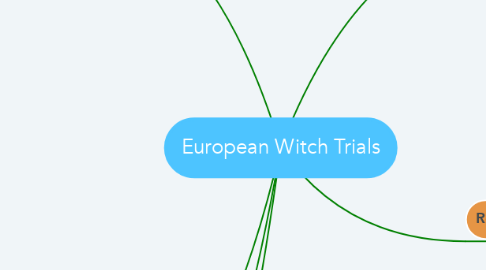
1. Social
1.1. Tensions
2. Psychological
2.1. Torture
2.2. Belief
2.2.1. cognitive
2.2.2. hallucinations
3. Political
3.1. Pat v Pleb
3.2. Political v Religious Superiority
4. Authors
4.1. Francis Hsu
4.1.1. favors interdisciplimary approach
4.1.2. Absolute v Relative
4.1.2.1. Positive v Idealist
4.2. David Hall
4.2.1. rationalists failed
4.2.2. shift to interdisciplinary approaches
4.2.2.1. Thomas and Macfarlane adopt Anthropological approaches
4.2.2.1.1. witchcraft functional as stress reducer for social anxieties
4.3. Malcom Gaskill
4.4. Mary Douglas
4.4.1. Leprosy can be abstracted to fit into models of witchcraft accusations.
4.4.1.1. disease linked with immorality
4.4.1.1.1. leads to isolation and accusation
4.5. Mercia Eliade
4.5.1. argued for interdisciplinary approach
4.5.2. indian and tibetan magicians prideful about feats that horrify Europeans
4.5.3. Orgies used in accusations of Cathars, Templars, Jews and Christians
4.6. William Riddell
4.6.1. accounted for the judicial process under Canon Law
4.7. Lucy Mair
4.7.1. Interdisciplinary approach needed
4.7.2. characteristics of witchcraft similar in different cultures
4.7.2.1. infanticide
4.7.2.2. posession
4.7.2.2.1. exorcism
4.8. Johnathon Pearl
4.8.1. public exorcisms in France
4.8.1.1. Demonologists were devoted to faith
4.8.1.1.1. once belief declined so did the trials
4.9. Edward Monter
4.9.1. Ratonalist V Romantic
4.10. Nachman Ben-Yehuda
4.10.1. structural changes in the family and women being pressured into getting a job contributed to the rising number of single women who were more prone to find work that was socially unaccceptable.
4.11. Wm. Bradford Smith
4.11.1. Friedrich Forner important as one of the crucial architects of the Catholic Reformation
4.11.1.1. Calvinists deemed heretics
4.12. Thomas Schoeneman
4.12.1. Interdisciplinary approach needed to further study
4.13. Deborah Willis
4.14. H.C. Erik Midelfort
4.14.1. test hypotheses of recent scholarship
4.14.2. Confidence
4.14.2.1. as people lost faith in the magistrates the magistrates lost faith in the judicial process
4.15. Rodney Stark
4.15.1. God shaped Western culture
4.15.1.1. refuted popular belief about conflict between science and religion
4.16. Stuart Clark, Bengt Ankarloo, Edward Monter
5. Period
5.1. Reformation
5.2. 14-15th C
6. Religion
6.1. Catholic
6.1.1. corruption
6.1.2. dissent
6.1.3. heresy
6.1.3.1. Education
6.1.3.2. Behavior
6.1.3.3. Witchcraft
6.1.3.3.1. Devil
6.1.3.4. Pagan Religion
6.1.4. Counter-Reformation
6.2. Protestant
6.2.1. Reformation
6.3. Scapegoats
6.3.1. Women
6.3.1.1. Desire for Equality
6.3.2. Jews
6.3.2.1. Mysticism
6.3.2.2. Anti-Semitism
6.3.2.2.1. Expulsion
6.3.3. Lepers and Poor
6.4. Trials
6.4.1. Accuastions
6.4.2. Torture
6.4.2.1. Breaking
6.4.2.1.1. similar confessions
6.4.3. Execution
6.4.3.1. Burning Times

